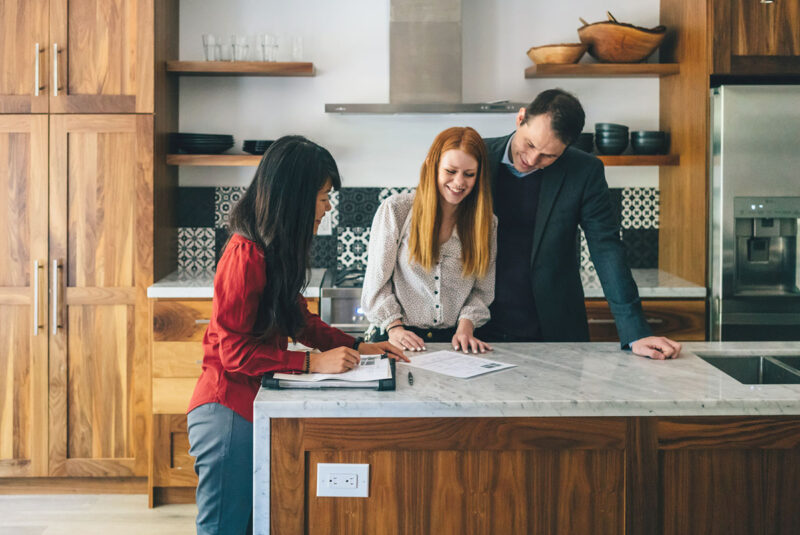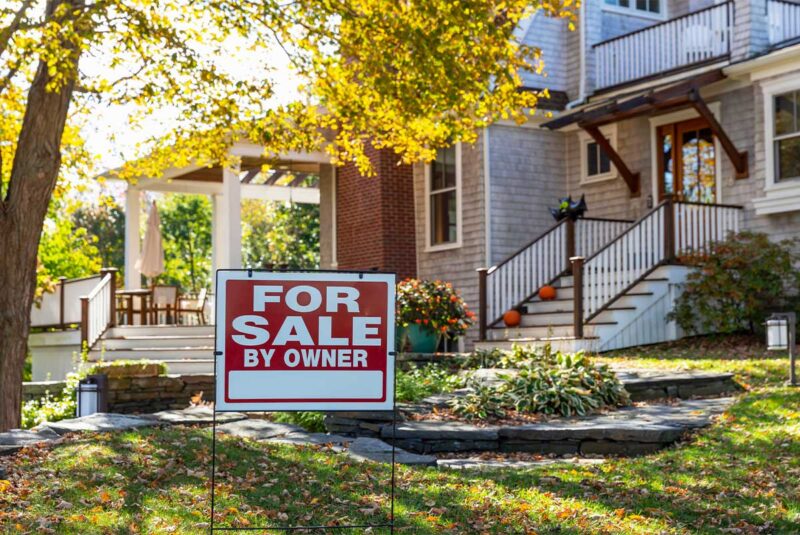Ready To Buy a Home?
Get Approved to Buy a Home
Rocket Mortgage® lets you get to house hunting sooner.
Buying a home is an exciting step to take – especially if it’s your first home. It’s so easy to get caught up in the excitement and thrill. But if you try and buy a home with your heart, and not your head, you may end up in a house that doesn’t meet your needs or a house with issues and defects that can tear through your monthly budget.
To avoid a severe case of buyer’s remorse, you need to ask the right questions before you sign on the dotted line. We’ve collected 15 of the most important questions that must be asked before you buy a house.
3 Questions To Ask Yourself Before You Buy a House
Before committing to buying a home, first-time home buyers and repeat home buyers should consider their total budget, their new home must-haves and how much work they’re willing to do on a new home.
Asking these 3 questions can help get you started:
1. Does the house fit your budget?
House hunting without a budget is almost sure to get you in trouble. I mean, we get it. The market presents plenty of tempting opportunities to spend – and spend even more. The trouble is that you may make an offer on a home you love – but can’t reasonably afford.
Before you commit to buying a house, make sure you account for expenses beyond the down payment and the mortgage principal and interest including:
- Property taxes
- Homeowners insurance
- Private mortgage insurance (PMI) or mortgage insurance premiums (MIPs)
- Homeowners association fees
- Closing costs
- Moving expenses
- Renovation and repair costs
- Ongoing maintenance costs
Let your budget be your guide. Setting – and sticking to – your home buying budget will help safeguard against overspending. While you may be tempted to look for your dream home in a higher price range, stay focused on listings at or below your maximum price point. The trick is to find a home you love in the price range you can afford.
2. Does the house meet your needs and wants?
House buying budget? Check! Now you need to list and prioritize your new home must-haves, like the number of bathrooms or parking spaces, the garage or the layout. Make a list of the essential features that could make or break a deal.
Add the type of neighborhood you want to live in to the list. Do you want to live in a family-friendly, quiet community or a busy, urban area? Do you need to think about the school district? If it’s important, add it to your list.
You can also list the features you’d love – think nice-to-haves, like a finished basement, a wood-burning fireplace or quick access to the highway – but wouldn’t miss if the house or neighborhood didn’t have them.
3. Will you need to make minor repairs or major renovations after you buy?
Knowing whether you’re up for renovations or want a move-in ready house can save you time while you’re house hunting. If you love the idea of tearing out old bathrooms and kitchens, a fixer-upper might be a great option for you. You can even use a fixer-upper loan to bundle the money you need to buy and renovate the home in one convenient payment.
But if you just want to move in, turn on the lights and relax on the couch, a house that needs work is probably not the best choice.
7 Questions To Ask About the House
Getting more information about a potential home can help you evaluate the property with open eyes and help you make any tough decisions while you’re house shopping.
1. Will you live in or near a flood zone or other disaster-prone areas?
This is a question many buyers don’t think about, but it directly relates to the house, the type of homeowners insurance you’ll need and the cost. Buying a home in an area prone to natural disasters will impact you in many ways, including financially.
Many mortgage lenders won’t approve a loan without proof of home insurance. When a home is at risk of flooding or experiencing other natural disasters, insurance companies may:
- Deny property coverage
- Charge an annual premium that results in high monthly payments
To make sure you’re protected, you may need to purchase specialized insurance, like flood insurance, hurricane insurance or earthquake insurance.
2. What’s the history of the house?
You may not learn some property details until you make an offer. Some online sleuthing can help uncover some details. But to thoroughly evaluate any existing or potential concerns, you’ll need a clear picture of a property’s history.
Learning about details like existing property liens upfront may help you avoid complications that could delay or derail closing on a home.
You should also look into a home’s history of insurance claims. Filed claims may signal possible problems down the road. For example, a water damage claim may translate into a higher likelihood of mold issues and future health hazards.
3. Are there health or safety hazards?
Older homes have a certain allure for many buyers. In fact, homes with historical significance can be a wise investment. Whether the house is vintage or brand new, buyers need to consider any health hazards on or near the property.
Dealing with issues like lead paint, asbestos, methane and mold can be dangerous – and expensive.
Many states require sellers to disclose known hazards in the home. To uncover any unknown issues, adding a home inspection and other contingencies to your purchase offer would be a good idea, especially if you suspect there may be health hazards in the home.
4. What improvements or repairs have been made to the house?
Most people want to keep their homes in good shape. If a home is more than a decade old, it’s reasonably safe to assume the homeowners have made some improvements or repairs.
The DIY home improvement craze – which has taken off over the last few years – features YouTube videos and online guides that promise homeowners they can skip the professional contractors and tackle improvements and repairs on their own. But if an owner’s DIY dreams do more harm than good, it could become a nightmare for a new owner.
For better or worse, some renovations and repairs can change the integrity of a home and problems may not show up until much later – like right before you sign on the dotted line.
This can affect insurance coverage for a new homeowner. Some insurance providers won’t cover claims if the problem is related to work done by a former owner or someone unlicensed.
5. How old is the roof?
Knowing the age of the roof can give you a good idea of whether you’ll be facing a costly roof replacement soon.
A roof typically lasts between 15 – 30 years, depending on the type of material, the home’s location and its exposure to the elements. A home inspection can help you determine the age of the roof and how soon you may need to replace it.
If the roof must be replaced soon, you’ll need to budget for a new roof during the home buying process. You should also consider asking for a seller concession if the seller is unwilling or unable to fix the roof before closing.
6. How old are the appliances?
Appliances that stay with the home are another source of potential problems to consider as a homeowner – especially if you’re a first-time buyer who has always rented. When you’re renting, you can call your landlord when an appliance calls it quits. But when you’re a homeowner, you’ll pay to have the appliance fixed or replaced.
While you’re touring a home, check the condition of the appliances. If the appliances are older, you’ll need to calculate how much it would cost to replace them and add the cost to your home buying budget.
7. What’s included in the sale?
Be sure to ask for a list of everything included in the home purchase. You’ll want to know whether certain appliances or other assets come with the home or whether you can buy them.
A buyer can request that a seller leave certain items on the property (like a swing set) or remove items (like an above-ground pool).
If you really want, let’s say, those blackout curtains in the living room that aren’t included in the sale, work with your real estate agent or the seller to negotiate a price on the curtains or include the curtains (and anything else you want) in a renegotiated offer.
5 Questions To Ask About the Neighborhood
Buying a home isn’t just about the house and property. Location matters, too. Both when you live in a home and later when you sell it. To figure out if your perfect home is in the right neighborhood for you, ask yourself these five questions:
1. How much have other houses sold for in the neighborhood?
Ask about the property value of other homes in the neighborhood. And ask how much other homes have sold for in the last 6 – 12 months. Your real estate agent can provide a comparative market analysis (also known as a CMA) of recently sold homes and pending sales.
Sometimes property values and how the market behaves are very different. Recent sale prices can affect your home buying budget and what you offer on a home.
Prospective buyers typically start with a low offer, but in a hot market (aka a seller’s market), you may need to make an offer at or above asking.
It’s a hot market when the demand for homes is greater than the supply. Homes sell very quickly – sometimes even before they’re listed – and a bidding war can make a high price even higher.
By the way, this is a solid argument for creating a budget and sticking to it. With a firm budget in place, you’re less likely to get caught up in a bidding war and go over your max.
2. How is the neighborhood?
You can ask the seller about the neighborhood, but you might benefit from firsthand experience. Consider walking or driving around at different times of the day and different days of the week.
While you’re gathering intel, you may come across the loud neighbors next door who like to party hard on the weekend. Or maybe you’ll learn there’s a commuter train that passes by the home at 6 a.m. three times a week. These kinds of discoveries might sway your opinion on the home.
3. What are the schools like?
Imagine a couple with two young children who have many years of schooling ahead of them. The family finds their dream home, but unfortunately, it’s not in their preferred school district. For many parents, a less-than-ideal school district is a reason to reconsider buying an otherwise perfect home.
A school district may seem like a public amenity only relevant to parents, but it’s worth considering even if you don’t have children. If you decide to sell the property, being in a good school district can help attract more buyers.
4. How much are utilities?
You can ask your agent or the seller for a copy of their utility bills from the past year. Knowing the average utility costs in the area can be helpful, but having the utility bills in front of you will offer more accurate information.
The home you’re buying may have features and characteristics that affect the cost of utilities. Is there a heated pool on the property, older windows or less insulation? It’s important to consider how these expenses might affect your monthly budget.
If you can’t get copies of the utility bills, consider calling local utility companies to ask for area estimates, including seasonal spikes.
5. Are there HOA fees and assessments?
An agent will likely know the homeowners association (HOA) fees for a property, but the seller will have more insight.
A seller can tell you if they think the fees are worth it. They can tell you if the fees have gone up since they moved in (and by how much). They can share if there were any assessments (extra money charged to homeowners for one-time repairs) and what they were for.
The answers to these questions will give you a better idea of the potential long-term cost of living there.
Who Can Help You Answer These Questions?
Guess what? You already have all the resources you’ll need to find the answers to the 15 essential questions. To find the answers, talk to:
Your real estate agent
Your real estate agent can help you determine what a home is worth by providing a competitive market analysis (CMA) of the home in relation to similar homes in the neighborhood. They can also provide insights into a neighborhood based on their own experience and information they may be receiving from colleagues.
The seller or their real estate agent
If you have questions about a house, including why the seller is selling, you have every right to ask. You can ask the seller directly or let your agent and their agent talk.
The amount of information a seller is legally obligated to disclose is usually based on a state’s Seller Disclosure laws, with some states requiring more disclosure than others. However, if a seller seems unwilling to share information about their home, it may be a sign of underlying issues that they’re concerned will negatively affect the sale price.
Your home inspector
Another crucial resource for home buyers is the report they get from the home inspector. A home inspection isn’t always required, but it’s usually worth spending the money to get one because it generates a detailed checklist about any potential issues with a home and property.
Because a home inspection is usually completed after an offer has been accepted, make sure you have an inspection contingency in your purchase agreement in case the inspection reveals any serious issues.
What if You Don’t Like the Answers?
Hopefully, your real estate agent, the seller and the home inspection offer satisfactory answers to all your questions.
But if you have other concerns about the home that need to be addressed before you buy the home, you can ask for a discount on the sale price to help cover the costs of any necessary repairs.
If the answers you get make you question your commitment to buying the home, you can cancel the deal up until closing. With the right contingencies in place, you can back away from the deal penalty-free. But if you opt out of the deal without contingencies in place, you risk losing your earnest money deposit. Consult your real estate agent or a real estate attorney if you’re contemplating walking away from a purchase.
There Are No Dumb Questions, Only Expensive Ones
As you can see, many benefits come from knowing what to ask during the home buying process. To list a few: it can help you make an appealing – and affordable – purchase offer; it can save you time; and it can save you money. Armed with these 15 essential questions, you should feel confident that everything you ask will help you get the keys to the right home for you.
Take the first step toward buying a home.
Get approved. See what you qualify for. Start house hunting.
The Short Version
- First-time and repeat home buyers should consider their total budget, their new home must-haves and how much work they’re willing to do on a new home
- Buyers should ask about the price of comparable homes in the area, the history of the home and any safety hazards
- Ask sellers if there have been major repairs on the home, what’s included in the sale and why the seller is leaving




